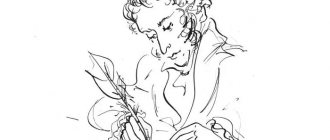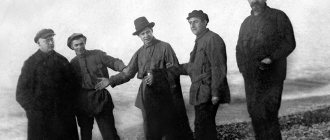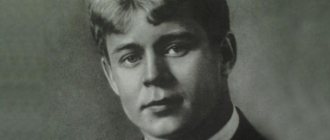The last years of Sergei Yesenin’s life were haunted by fears and uncertainty. Whether the poet tried to drown them out with alcohol or, on the contrary, they developed against the background of an addiction to alcohol is a question. One way or another, against this background of internal uncertainty, fears and disappointment, Yesenin writes the poem “The Black Man,” the analysis of which I propose.
☠️ The poem took a long time to write and was completed shortly before the tragic death of Sergei. The original draft was much longer, but the poet cut the score too difficult to understand and cut it almost in half. This did not make the lines any less depressing; fear and uncertainty about the future are literally physically felt in them.
History of creation
Yesenin began working on this poem back in 1923, but, according to his contemporaries, it turned out to be too big and gloomy. What prompted the author to shorten it remains a mystery, but even in its simplified version the work is shocking with its depressiveness and depth of suffering. The history of the creation of the poem “The Black Man” is closely intertwined with its plot. At that time, the poet already had problems with alcohol, which were also reflected in the text. His loved ones were seriously worried about him, because every day the internal discord became more obvious, the work became darker, and the creator himself behaved more and more nervously and restlessly.
Work on the creation of the work began during the American tour, after which a continuous black streak began in the poet’s life. He felt that the new government was alien to him, that Soviet Russia did not need him, that everyone was waiting for the subtle lyricism of his poetry to replace revolutionary marches. In addition, there was a bitter aftertaste from the breakup with Isadora Duncan. All these events and moods formed the basis of the poem. In 1925, “The Black Man” was completed, and was first published in the magazine “New World” for January 1926.
main idea
It is quite difficult to isolate the main idea from the huge number of synonyms “disappointment, anguish, loneliness, borderline state, fear of life and fear of death.” This is all true. The meaning of the poem, purely technically, is to present internal breakdown through dialogue with a “black man.” The main idea of the entire story is the endless tragedy hidden deep inside the “happy man”, whom everyone sees, but no one understands.
Perhaps with this work the author summed up his activity, devaluing it. A talented poet is characterized by doubts and hesitations, and he is rarely satisfied with himself. Yesenin’s condition was aggravated by literally everything: a midlife crisis, when the joy of youth had passed, but the confidence of maturity was not yet there, the surrounding situation (dissatisfaction with the revolution, conflict with the authorities), the general global trend of disappointment and self-destruction.
Genre, size and composition
The creation is an appeal, a message from the lyrical hero to a friend, to whom he informs from the very beginning that he is “very sick.” The monologues of the man in black are written in the same form, in which he addresses the author of the letter. Using this method, Yesenin shows the attitude to life of two characters. The composition in the poem “The Black Man” is dialogical, reminiscent of a play - it represents a conversation between two characters, in which the poet’s remarks are interspersed, indicating what should happen on stage during the conversation. There is also a prologue and an epilogue: an introduction (address to a friend) and a conclusion (the disappearance of the guest and the debunking of the mirage). The main part is divided into two actions.
The theatrical composition is not typical for this kind of work, because the genre chosen by Yesenin is the lyric epic poem. It shows not only the internal state of the narrator, but also depicts his story, that is, a very specific plot appears.
The work is written using a tonic versification system based on an equal number of stresses in a line. The size of the poem “Black Man” is dolniks.
Literary direction
The literary direction of the poem is not clearly defined; in terms of the time of creation and innovative techniques, this work is closest to modernism, but some of its characteristics are also inherent in other directions. These include:
- mystical realism - there is no doubt about the reality of the suffering character, but his visions have an unusual and even mystical overtones, and life details are described in rough form;
- romanticism - is felt in the description of the poet’s feelings and the themes raised, characteristic of this direction (internal contradictions, loneliness, death);
- existentialism - can be traced at the moment when the character is in a borderline state, that is, a drunk loses consciousness, evoking his real essence, which is sick of the poet’s lifestyle.
The poem is written in the tonic system of versification, the poetic meter is dolnik, which best conveys the author’s feeling of weariness from life and reluctance to see his reflection in the mirror.
Issues
- Disappointment. The main question that the author raises is a critical look from the outside at his own insignificance. A kind of summing up of life. The man in the top hat is not the personification of death; he does not want to harm the lyrical hero. With the help of his image, the poet wants to look at himself from the outside, to realize how he lives. The poem became Yesenin’s full-scale confession before his death. Accordingly, the main problem of “The Black Man” is revealed to us - disappointment in oneself.
- Alcoholism. In the epilogue, the author dispelled dark fantasies; his judge turned out to be a leading man, an alcoholic nightmare. He very self-critically notes that he was at war with the mirror, that is, the black man is his alter ego, which exposed itself. Other thoughts come to him under the influence of alcohol, and it is obvious that the effect of hallucination completely took possession of the narrator for some time. And he himself admits that he is already sick of it.
- Debunking love. “The nasty girl of over forty” is Isadora Duncan, a dancer with whom Yesenin had an affair. It ended, and the poet realized that he was mistaken in his feelings, and, perhaps, in his beloved. In any case, he sarcastically mocks his passion, showing the contrast between who he imagined and who he was actually with.
- Disappointment in creativity. The author calls his lyrics “dead and languid,” emphasizing that they only serve to seduce pimply female students.
What's the point?
By introducing a double into the book, who, according to the writer’s idea, says the most terrible things about the lyrical hero, the poet exposes all his vices. A.S. Pushkin once wrote about the difficulty of confessing in public, and I would like to say that Yesenin managed to fully express his sincerity in this matter, despite the difficulty. He spared neither love, nor creativity, nor himself. The meaning of the poem “Black Man” is an attempt to ease the soul before death. The author believed in only one god - art, so he presented his final repentance to him.
His soul was scorched like the field that he wanted to tell Shagana. He takes turns to violate everything that is dear to him and devastates his heart, he does not want to feel pain and disappointment anymore. His creativity dried up, his stormy life burned him out, because he lived for three people - there were so many impressions in his life. But he did not leave without a trace; in the last lines he breathed his entire essence, giving it immortality.
Appeal to a friend
In this poem, as in several other works by Yesenin, there is an appeal to an unknown friend “My friend”, the poem begins with the same lines:
My friend, my friend, I am very, very sick.









